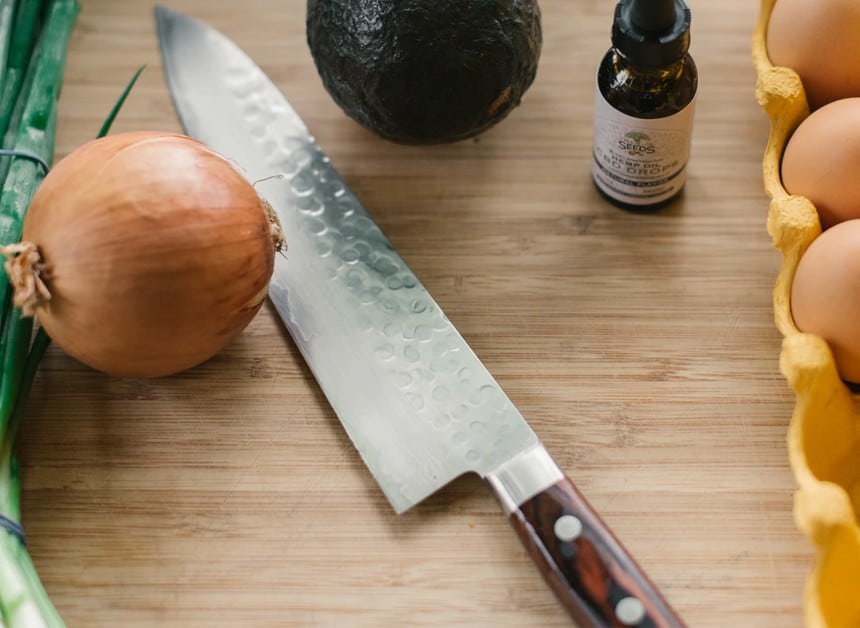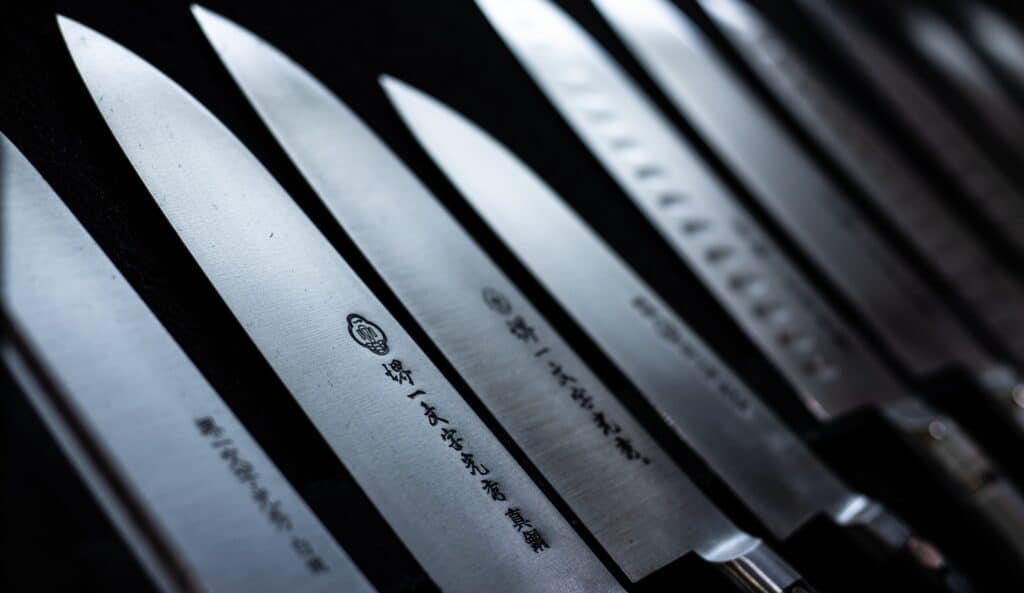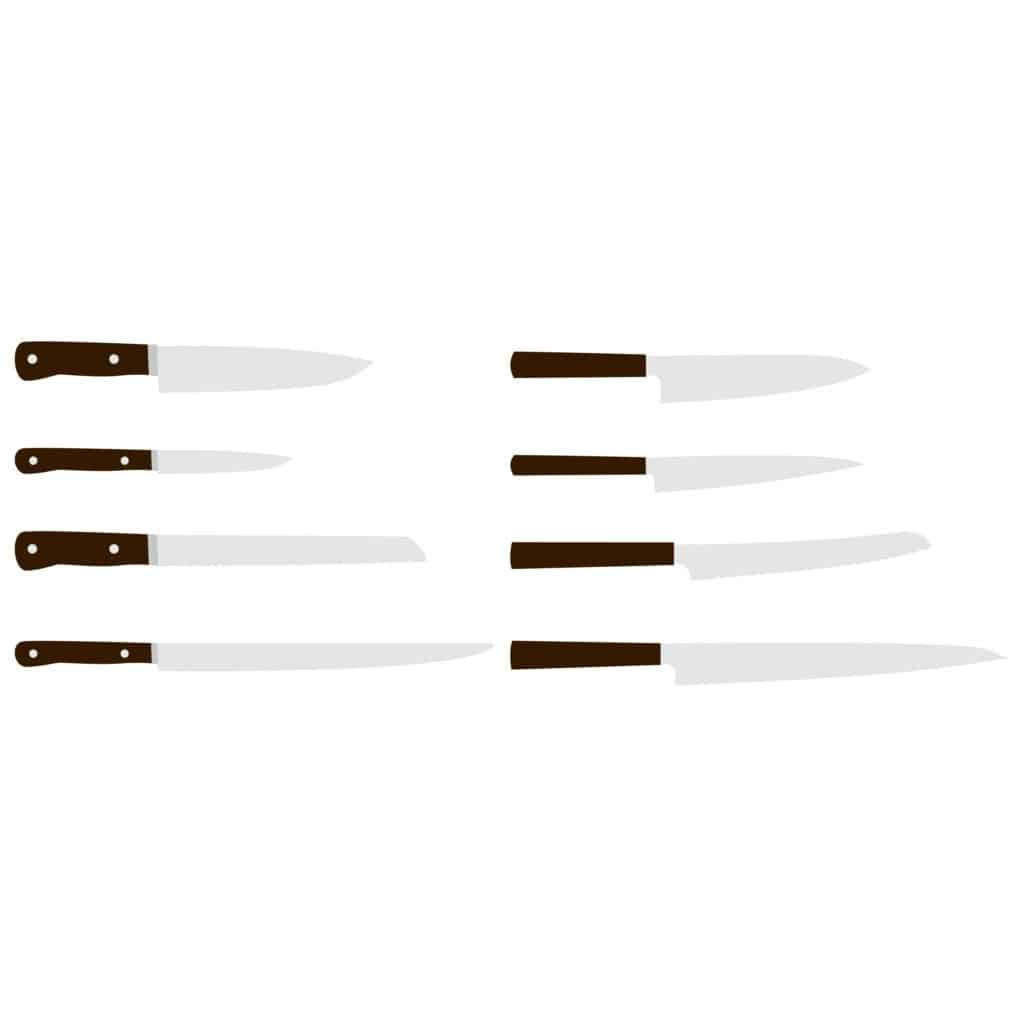
Damascus steel has a long and rich history. It’s a steel surrounded by mythology and its unique appearance only adds to its legend.
Damascus steel gains its name from the Syrian capital, Damascus. The true name of the steel is actually wootz steel; however, It’s through the city of Damascus that wootz blades were traded to the west and hence it became known as Damascus steel.
Famed for its strength and beautiful design, Damascus remains a highly sought after steel today.
In this article I’m going to run through whether Damascus steel is really as good as its reputation would have you believe, I’ll answer some frequently asked questions about Damascus steel and I’ll give some of my recommendations for quality Damascus kitchen knives.
Damascus steel is a great steel for kitchen knives. Damascus steel is hard, allowing for a finer, sharp edge. The layering of two steel types also allows one softer steel to be introduced, increasing the flexibility of the knife and thus making it more durable.
What is Damascus steel
Firstly, let’s recap exactly what Damascus steel is.
Damascus steel, also known as wootz steel, gains its name from the Syrian city of Damascus, through which wootz steel was traded to the western world.
Damascus steel is created by the forge welding of two different types of steel, usually one high carbon and one low carbon steel.
This steel is layered together in flat plates, heated, folded and hammered flat, over and over again to gain more and more layers.
Sometimes a drilling technique is incorporated into the forging, where holes of varying depths will be drilled into the steel during the process, this will give the effect of a raindrop splash on the blade.
The resulting steel is dipped in acid to reveal the fine layers created during forging that gives Damascus its unique flowing water appearance.
Now that we know the basics of what Damascus steel is, let’s take a look at why this technique is beneficial.
Benefits of Damascus steel
The benefits of Damascus steel come down to two main factors:
- A sharper edge
- A beautiful design
As I described in the section above, Damascus steel is usually forged from the layering of two different steel, a low Carbon and high Carbon steel.
The reason this is beneficial is that on their own neither would make a great blade.
High Carbon steel is hard and can hold a very fine edge, but it’s also brittle and can easily chip and snap.
Low Carbon steel is soft, it won’t hold an edge longer but it has much more flexibility and will not easily chip.
Layering these two types of steel together merges the attributes of both. The result is a steel that’s hard enough and flexible enough to retain a sharp edge without chipping.
That sounds great, right? But there’s a very important factor to look out for if you’re purchasing a Damascus knife.
A Damascus knife is only as good as the steel used to forge it. If two low-quality steels are used then the resulting blade will be low quality too.
So just because a knife is Damascus steel doesn’t automatically make it better, let’s talk more about that next.
Is Damascus steel better than other steels
To answer the question directly, Damascus steel is not better than every other steel.
That isn’t because it’s a poor steel forging technique, it’s just because modern-day alloys can be produced with such high precision they create a single steel that already has equal qualities to Damascus, without the need of layers two different steels together.
That doesn’t mean Damascus steel is bad, far from it in fact. It’s just that whereas in the past it would be hard to match Damascus as we simply lacked the technology, modern-day quality steel can have all the same attributes in terms of strength as Damascus.
There is still one major benefit to Damascus steel though, and that is the beautiful pattern that is created from the layering technique. Many people still choose Damascus steel for this very reason.
In terms of selecting a good Damascus steel, Damascus steel is still only as good as the steels that have been used to forge it.
It’s a bit like cooking. You can use an identical technique to make two pasta sauces, but if one chef uses freshly picked tomatoes from the fields of Tuscany, and the other uses four-week old ones from the back of the fridge, you’ll get a huge quality difference in the final result!
If you purchase a quality Damascus blade then you will get a good result.
However, modern-day forging has advanced far beyond the days of wootz steel first being traded through the city of Damascus.
The folding technique of making Damascus used to be one of the few ways of balancing hardness and flexibility to create a steel with both attributes.
With our modern-day understanding of creating balanced alloys, the high-quality steels made today are already well balanced between hardness and flexibility, without the need of the Damascus forging technique.
Is Damascus steel magnetic
Damascus steel contains Iron and therefore it is magnetic.
That’s in the sense that if you have a magnet, it will stick to a Damascus blade; however, Damascus itself does not act as a magnet.
If you have a magnetic knife block, a Damascus knife should stick to it.
Is Damascus steel stainless
Damascus steel is not always stainless steel, it depends on the steel used to forge it.
Most modern-day Damascus knives are stainless steel; however, it’s always worth checking the composition of the steel before you buy.
Even when knives are marketed as stainless steel, it doesn’t necessarily mean they are a good quality stainless steel.
The best way to check is to find out the name of the steel. It’s usually something quite robotic, like VG-10, AUS-10 or VG-MAX.
Then do a Google search for the steel type and composition, taking an example above you might search ‘VG-10 composition’
Any reputable steel will have search results showing exactly what the steel is made from.
To check the quality of stainless steel you should focus on its Chromium content. The higher the Chromium content the better the stainless steel.
Steel can be called stainless with just a 10.5% Chromium content, but I would consider anything below 13% to be poor, especially for the price range you’ll have to pay for a true Damascus steel knife.
Here’s a useful table of how I would categorize different levels of Chromium content in steel.
| Category | Chromium content |
| High-Quality Stainless Steel | > 14% |
| Medium-Quality Stainless Steel | 13%-14% |
| Low-Quality Stainless Steel | <13%(<10.5% is not stainless steel) |
So, using VG-10 as an example, a quick Google search of ‘VG-10 composition’ shows a Chromium content of 15%, which can be considered a high-quality stainless steel.
Is Damascus steel strong
Real Damascus steel is usually very strong. Although in the knife world it’s usually referred to as hardness.
Again, this is very dependent on which steel has been sued to forge the Damascus blade. But Damascus is made specifically to be hard, so if a knife is genuine Damascus steel then more likely than not it will be hard.
You should be able to find the Rockwell hardness of a good Damascus knife. Anything above 58 on the Rockwell scale is pretty good. A quality Damascus knife will probably be above 60.
Another good way of checking the hardness is to look at the Carbon level.
As I described above for Chromium. You should be able to find the name of the steel used for a Damascus knife.
Then do a Google search for its composition. Using the steel VG-10 as an example, you would search ‘VG-10 composition’.
The higher the Carbon the harder the steel.
Here’s a useful table of how I would categorize different levels of Carbon content in steel.
| Category | Carbon content |
| High Carbon Steel | > 0.9% |
| Medium Carbon Steel | 0.5% – 0.9% |
| Low Carbon Steel | <0.5% |
So, using VG-10 as an example, a quick Google search of ‘VG-10 composition’ shows a Carbon content of 1%, which can be considered a high Carbon steel.
Is Damascus steel worth it
I think Damascus steel is worth the price for those with an interest in quality, beautiful, Japanese style knives.
If you’re just looking for a durable knife for a busy family or commercial kitchen I’d recommend a western-style ‘workhorse’ type knife like a Wüsthof (opens new tab) instead.
Genuine Damascus steel is very good quality, it’s hard, quite durable and usually stainless.
When you start to approach steels with >1% Carbon they will always be at the higher price range, whether they are Damascus or not.
As a result, genuine Damascus knives are on the upper end of the price scale.
If you see a ‘Damascus knife’ for under $100 then it’s probably not genuine and the pattern has probably been printed on, unless it’s only a small knife such as a paring knife (or the Japanese equivalent, a petty knife).
You’ll probably be looking at spending at least $100 on a single Damascus knife; although, you can get them at a lower cost-per-knife if you buy a set.
The quality steel, combined with the beauty of Damascus patterns makes them unique. If you’re a bit of a knife enthusiast then I’m sure you wouldn’t regret owning a Damascus blade.
My Damascus steel knife recommendations

View the Shun Classic on Amazon (opens new tab)
My personal recommendation for a Damascus knife would be this Shun Classic 8 Inch Chef’s Knife.
Shun are a Japanese company that produces their knives in the Japanese knife capital city of Seki.
The VG-MAX steel used for the blade has a Carbon content of 1.2% and a Chromium content of 16%. That’s mighty impressive and the result is a super sharp knife that is extremely resistant to rust.
If you’re looking for a knife with a stronger Damascus appearance, or perhaps a set of Damascus knives, I’d highly recommend taking a look at these other Damascus knife articles I’ve written too.
There are some absolutely stunning knives in there.
| More about Damascus knives |
| Best Damascus Chef’s Knives (opens new tab) |
| Best Damascus Knife Sets (opens new tab) |

